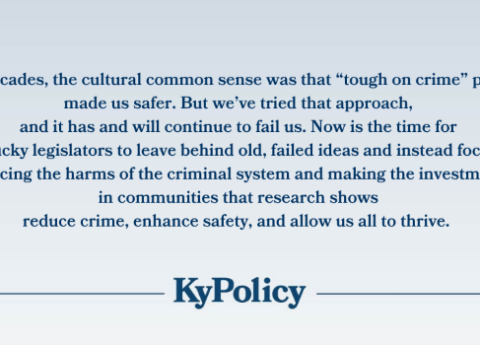With Kentucky’s 2021 General Assembly now behind us, and with issues of police violence against Black Americans remaining in the national spotlight this week, it’s a good time to recognize the progress in this legislative session’s criminal justice reforms while being honest about the many changes that are still urgently needed.
This year, the Kentucky General Assembly took small positive steps to reduce incarceration and its related harms. The session saw important legislative victories in policing, sentencing, reentry and juvenile justice.
In the area of policing, Senate Bill (SB) 4 significantly limits the issuance and use of no-knock warrants, representing an important step forward in the demilitarization of police in Kentucky. The new law will help to reduce the harms associated with the execution of no-knock warrants — harms that have primarily impacted Black people. In the context of overpolicing of communities of color, no-knock raids have become a violent practice with racially disparate outcomes that frequently result in the injury or death of people whose homes are invaded (as was the case with Breonna Taylor in Louisville).
Two sentencing reform bills will modestly reduce incarceration by raising the dollar amount threshold at which crimes become felonies. House Bill (HB) 126 increases the felony threshold from $500 to $1,000, better aligning Kentucky with other neighboring states and national trends. HB 402 raises the amount in past-due child support payments that constitutes a felony from $1,000 to $2,500, a necessary change because incarceration and a felony conviction actually make it more difficult for someone to catch up on support payments.
HB 497 expands support for individuals leaving incarceration to improve their process of reentry and reduce the likelihood of recidivism. Those leaving incarceration will now benefit from better access to photo IDs and employment-related documentation. Most crucially, HB 497 eliminates a lifetime ban on access to SNAP food assistance and other low-income assistance for people with a drug-related felony conviction.
The passage of SB 32 (formerly SB 36) will result in fewer felony charges against children in adult court, an important improvement in juvenile justice. SB 32 repeals the mandatory transfer of a child to adult court in any case involving a felony in which a firearm, whether functional or not, was present. The new language provides discretion to the judge and prosecutor, allowing them to consider the facts and circumstances of each case. By reducing incarceration and harms to justice-involved youth, this policy change will address some of the racial inequities in the juvenile justice system.
Many of the policy changes outlined above move us forward and represent a step in the right direction. However, the fact remains that too many Kentuckians are incarcerated or otherwise trapped in our criminal punishment system.
Other significant items introduced this session did not move forward, and they would have increased the impact that the 2021 legislative session could have achieved. These missed opportunities include SB 223, a bill to incrementally reduce pretrial incarceration, SB 224 relating to the persistent felony offender law and several bills related to cannabis legalization, which all would have been helpful in addressing incarceration and criminalization in Kentucky.
In future legislative sessions, the general assembly must do much more to build on work of this session and address critical issues such as policing violence, expanded sentencing reform, racial inequity in the juvenile justice system and support for reentry from incarceration. Furthermore, much work remains to be done to address our entrenched culture of punishment, as well as the unfortunate reality that many Kentucky towns and counties are financially dependent on the perverse economic incentives associated with the criminal punishment system.
The positive steps in the 2021 session are progress. But to interrupt the systems that have led to mass incarceration, we must dig much deeper and go much further.
This column ran in the State-Journal on April 26, 2021.



